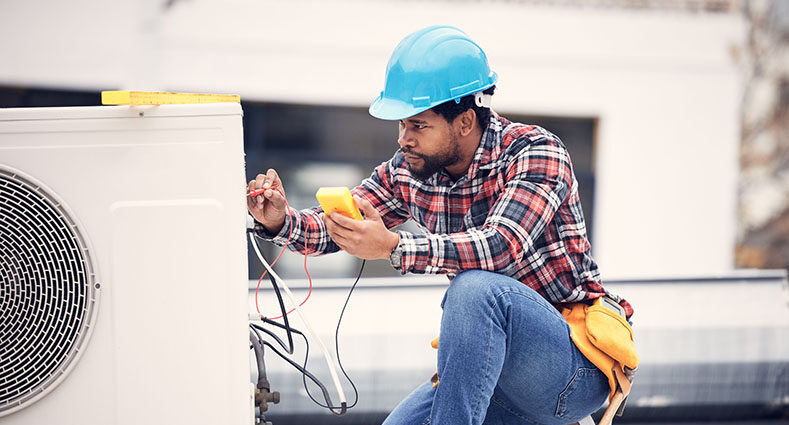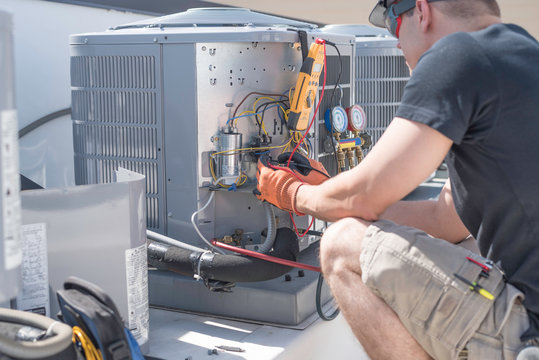All About A/c: Identifying Common Issues and Effective A/c Repair Approaches
Heating and cooling systems are crucial for preserving indoor comfort. Comprehending their elements and capability is important for determining usual problems. Homeowners usually deal with troubles such as inefficient cooling, weird smells, or climbing energy expenses. These signs can show underlying problems that might call for focus. Checking out DIY troubleshooting strategies can be useful, but understanding when to look for expert assistance is similarly vital. What actions can be taken to guarantee durable efficiency?
Understanding Your HVAC System: Components and Functionality
A heating and cooling system, typically considered the foundation of indoor environment control, consists of numerous essential elements that collaborate to regulate temperature and air quality. The primary aspects include the heating system, ventilation system, and cooling device. The heating device, normally a heating system or central heating boiler, creates warmth during colder months, while the air conditioning system cools down interior spaces during the summertime.

Typical Cooling And Heating Problems House Owners Encounter
Home owners typically deal with numerous typical heating and cooling troubles, consisting of irregular temperature circulation throughout their home. Additionally, uncommon noises throughout operation can suggest underlying issues that call for attention. Resolving these worries quickly is vital for maintaining suitable system efficiency.
Irregular Temperature Circulation
Lots of homes experience the discouraging issue of inconsistent temperature level circulation, where specific areas feel annoyingly warm while others continue to be too cool. This issue commonly develops from a variety of variables, including bad insulation, blocked vents, or an incorrectly sized cooling and heating system. When air ducts are not sufficiently secured or when furnishings blocks airflow, some areas might get insufficient cooling. Additionally, thermostat positioning can substantially impact temperature level guideline; a thermostat situated in a sunlit location may misrepresent the total temperature of your house. Routine upkeep, consisting of cleansing filters and making sure ductwork is clear, can aid minimize these discrepancies. Homeowners might also take into consideration zoning systems to far better control temperature levels throughout various locations of the home, promoting an extra comfortable living environment.
Uncommon Noises During Procedure
When an a/c system runs, unusual noises can suggest underlying problems that require attention. House owners may come across a series of noises, such as grinding, squeaking, or hissing. Grinding sounds frequently indicate damaged bearings or elements, while squealing can recommend loosened belts or components requiring lubrication. Hissing might suggest a refrigerant leak, which can endanger the system's effectiveness. In addition, banging audios may direct to loose ductwork or a concern with the blower follower. Each of these sounds offers as a warning, triggering homeowners to examine better. Neglecting these indicators can bring about even more significant troubles and costly repair work. Regular maintenance and timely interest to uncommon sounds can enhance system durability and performance, ensuring a comfortable living setting.
Indications That Indicate Your A/c Demands Repair Work
Exactly how can one tell if their a/c system needs fixing? Numerous indications might suggest underlying problems calling for expert attention. First, if the air conditioning stops working to cool down the area properly, it might recommend a cooling agent leak or compressor malfunction. Furthermore, a boost in power bills without matching usage modifications might indicate inadequacy in the system. Property owners ought to likewise be alert to unusual smells originating from the device, which might show mold and mildew development or electric problems. If the A/c regularly cycles on and off, it may be an indicator of a defective thermostat or other mechanical issues. Ultimately, the existence of water merging around the device can suggest a stopped up drainpipe line. Identifying these signs early can conserve time and cash, ensuring that the cooling system operates efficiently and effectively.
Do It Yourself Troubleshooting Techniques for Heating And Cooling Issues
When facing cooling and heating problems, homeowners can utilize a number of do it yourself troubleshooting strategies to determine the trouble. Secret methods consist of examining thermostat settings, evaluating air filters, and evaluating water drainage issues. These actions can assist pinpoint typical breakdowns before looking for professional support.
Checking Thermostat Setups
What steps should property owners take to assure their thermostat setups are right? They ought to validate the thermostat is established to the wanted temperature and mode, whether heating or air conditioning. Looking for a clear display screen and validating the thermostat is not set to "hold" or "getaway" mode is necessary. House owners must additionally validate that the thermostat is degree and mounted in a location without drafts, straight sunshine, or various other temperature level affects. Furthermore, recalibrating the thermostat can help offer precise readings. If the thermostat operates on batteries, changing them might solve any type of problems. By systematically evaluating these factors, property owners can typically recognize and remedy thermostat-related troubles, promoting ideal heating and cooling system efficiency.
Inspecting Air Filters
Air filters play an essential function in maintaining suitable HVAC performance. They catch dust, irritants, and various other particles, making sure clean air circulation. Gradually, filters can come to be clogged, minimizing air movement and efficiency. To check air filters, individuals should initially find the filter, commonly discovered in the return duct or near the heating system. When located, they should examine the filter's condition-- if it shows up dirty or discolored, it likely requirements replacement. A lot of filters require transforming every 1-3 months, relying on usage and ecological elements. Regular assessment and timely replacement of air filters not only boost air quality however also extend the life-span of HVAC systems, protecting against prospective malfunctions and costly fixings.
Evaluating Water Drainage Issues
How can property owners effectively determine and resolve drainage issues within their cooling and heating systems? They need to evaluate the condensate drain line for blockages or blockages, which can lead to water buildup. Homeowners might utilize a wet/dry vacuum cleaner to remove any kind of debris obstructing the line. Next off, examining the drainpipe frying pan for corrosion or leakages is vital, as a harmed pan can trigger water to overflow. Normal cleaning of the drain line with a mixture of vinegar and water assists avoid future clogs. Furthermore, ensuring proper incline of the drain line promotes efficient water circulation. If these DIY strategies do not settle the problem, getting in touch with a specialist cooling and heating technician may be essential to stay clear of prospective water damages and system failure.
When to Call an Expert for Air Conditioning Repair Work

While some AC concerns can be dealt with with do it yourself techniques, there are scenarios where calling a professional ends up being essential. Property owners must seek experienced aid when they experience relentless troubles, such as insufficient cooling, weird sounds, or uncommon smells originating from the system. These signs may show much deeper largest hvac companies concerns that require specialized have a peek at this website knowledge and devices to diagnose and fix properly.

Preventative Maintenance Tips for A/c Durability
Regular preventative upkeep can significantly boost the long life of heating and cooling systems. Home owners need to arrange yearly examinations by qualified specialists to evaluate system effectiveness and identify prospective concerns. Consistently transforming or cleaning up air filters is essential, as this guarantees correct air flow and minimizes stress on the system. Additionally, checking and securing ductwork prevents power loss and boosts overall efficiency.
It is also advisable to maintain the outdoor system free from debris and vegetation, enabling peak airflow and warm exchange. Home owners must examine the condensate drain for clogs to avoid water damages and mold growth. Keeping proper thermostat setups and utilizing programmable choices can improve energy performance. Recording maintenance tasks aids track solution background and can help in determining reoccuring issues. By complying with these preventative procedures, people can make best use of the performance and lifespan of their HVAC systems
Frequently Asked Concerns
How Often Should I Change My HVAC System Filters?
Cooling and heating system filters ought to normally be replaced each to three months, depending upon use, filter kind, and environmental factors. Normal replacement helps keep effectiveness and air top quality, ensuring peak system efficiency throughout the year.
What Size Heating And Cooling System Do I Need for My Home?
To establish the appropriate HVAC system size for a home, one must think about square video, insulation high quality, and regional climate. Consulting a professional can aid assure maximum heating and ac service efficiency and comfort for the specific living room.
Exist Eco-Friendly Heating And Cooling Options Available?
Yes, eco-friendly a/c choices are readily available, consisting of energy-efficient heatpump, solar-powered systems, and geothermal heating. These alternatives minimize power usage and ecological influence, advertising sustainability while keeping reliable climate control for property and commercial spaces.
Just How Can I Boost My heating and cooling System's Power Effectiveness?
To enhance HVAC energy efficiency, one can routinely maintain the system, seal air leaks, mount programmable thermostats, make use of energy-efficient filters, and warranty appropriate insulation throughout the home to decrease power intake and improve efficiency.

What Is the Ordinary Lifespan of a HVAC System?
The ordinary life-span of a heating and cooling system usually ranges from 15 to 25 years, relying on variables such as upkeep, use, and the high quality of setup. Routine upkeep can substantially prolong its functional long life.
Final thought
In summary, an extensive understanding of HVAC systems equips house owners to determine usual problems and address small troubles effectively. Identifying signs of malfunction, using DIY troubleshooting techniques, and prioritizing normal maintenance can improve system performance and performance. When faced with intricate repairs, getting specialist assistance is crucial to guarantee safety and security and durability. By promoting awareness and aggressive care, people can appreciate a comfortable interior environment while reducing unexpected costs connected with heating and cooling failures.